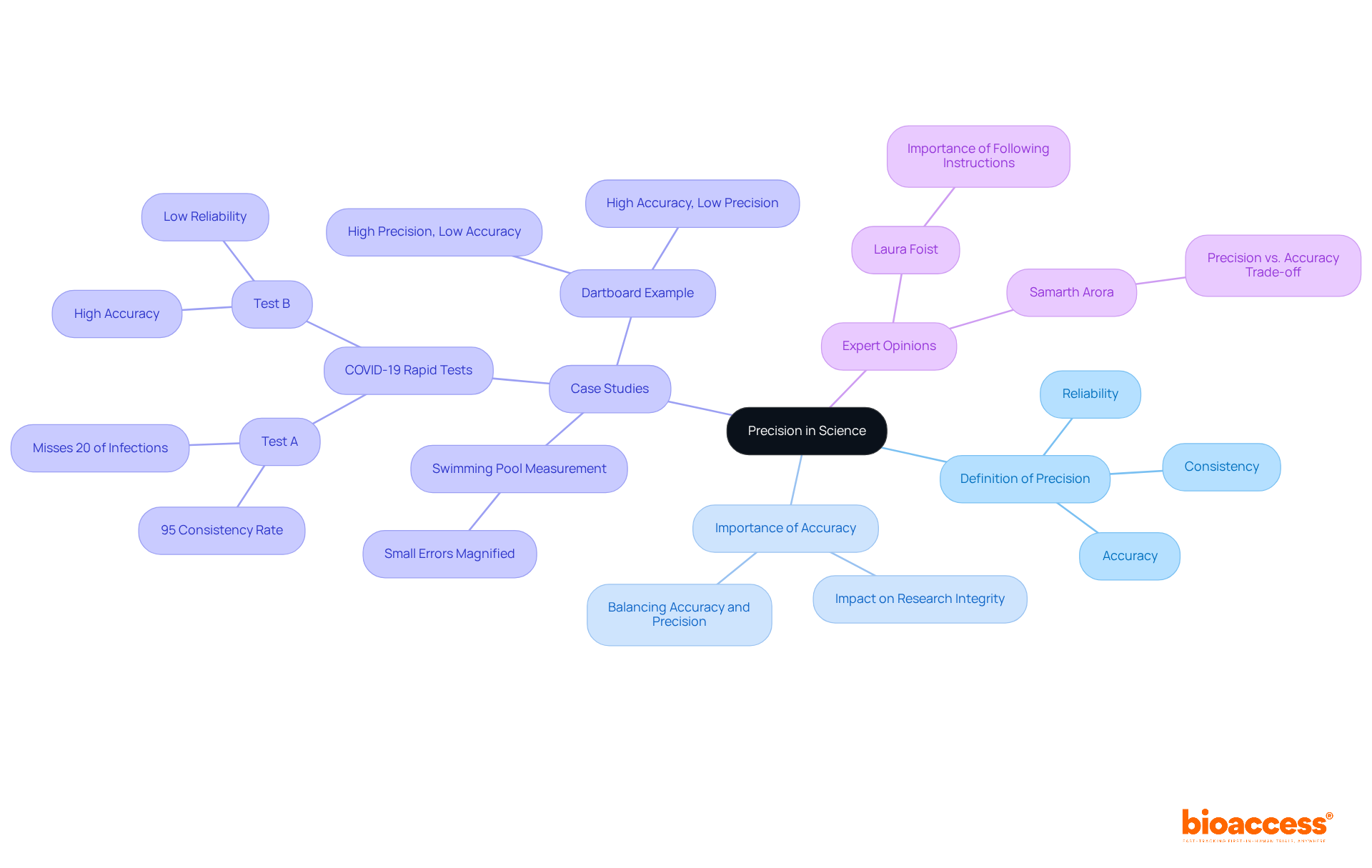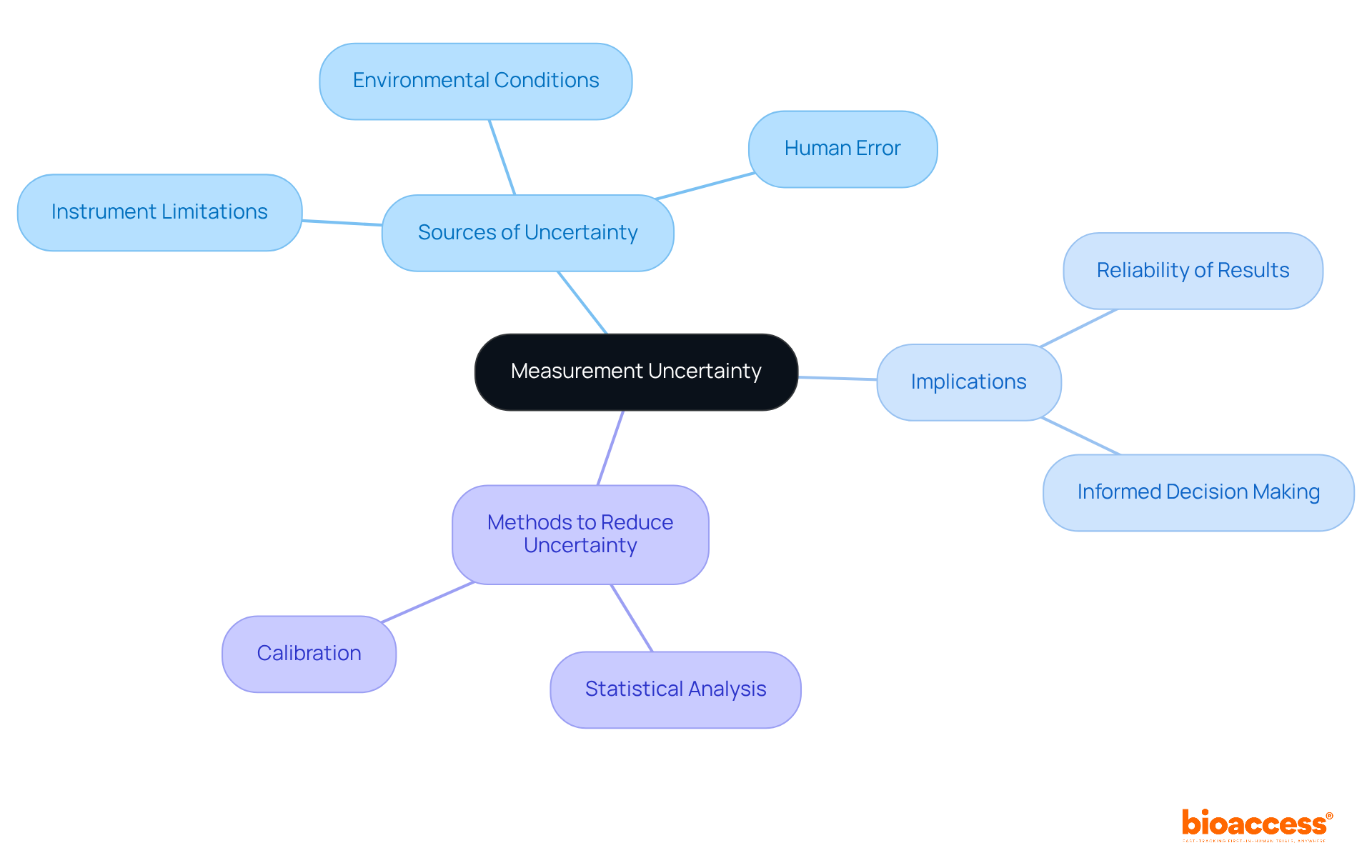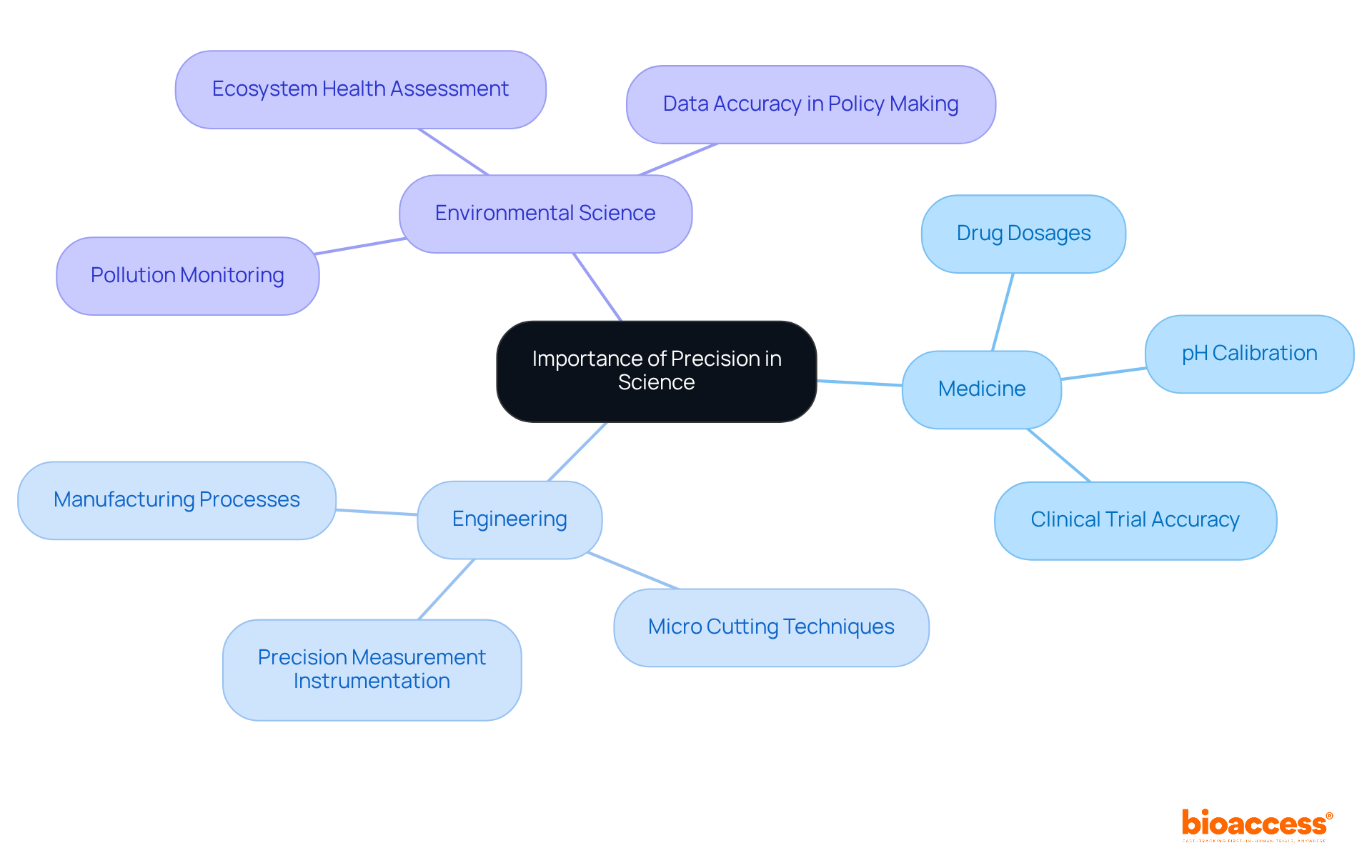


This article delves into the precise definition of accuracy in science, underscoring its critical importance across various disciplines. It highlights that precision pertains to the consistency of measurements rather than their proximity to a true value. For instance, in fields such as medicine and engineering, accurate measurements are paramount; even minor discrepancies can lead to significant consequences. This reality emphasizes the necessity for meticulous calibration and reliable data in scientific research.
In the Medtech landscape, the role of accuracy cannot be overstated. As challenges in clinical research continue to evolve, understanding the nuances of measurement accuracy becomes essential. By ensuring that data is both precise and reliable, researchers can mitigate risks and enhance outcomes.
Ultimately, collaboration among professionals in the field is vital. By sharing insights and best practices, the scientific community can collectively address these challenges, paving the way for advancements that benefit all. The next steps involve fostering partnerships that prioritize accuracy and reliability in research.
Precision in science stands as the backbone of reliable research, influencing everything from medical testing to environmental assessments. Understanding the nuances of what constitutes precision allows researchers to enhance the validity of their findings and make informed decisions that significantly impact real-world outcomes.
Yet, how does one navigate the delicate balance between precision and accuracy, especially when even minor discrepancies can lead to substantial errors? This article explores the critical role of precision in scientific research, delving into its definitions, implications, and the challenges that arise across various disciplines.
A precise definition in science describes accuracy as the extent to which repeated observations under stable conditions yield consistent outcomes. This measure of consistency and repeatability offers a precise definition in science regarding how closely individual values align with one another. For instance, when a scientist weighs a substance multiple times and consistently obtains similar results, those values are deemed accurate. However, it’s vital to note that a precise definition in science indicates that exactness does not equate to accuracy; a set of measurements can be exact yet deviate from the true value. This distinction is critical in research, as it directly impacts the reliability of data and is necessary for establishing a precise definition in science based on the conclusions drawn from experiments.
Recent studies underscore the importance of accuracy across various scientific fields. In medical testing, for example, the reliability of results hinges on achieving both exactness and accuracy. A case study involving COVID-19 rapid tests illustrates this point:
Such findings highlight the necessity of balancing these two aspects to ensure effective decision-making in healthcare, as emphasized in the case study titled "Medical Testing: When Lives Depend on Getting Both Right."
Moreover, the significance of precision extends beyond mere measurements. In scientific investigations, even small errors can be magnified, leading to substantial inaccuracies. For instance, a minor discrepancy in measuring water for a swimming pool can result in a significant difference in the total amount required. Therefore, dedicating time to measure precisely and understanding how to operate equipment correctly are essential practices that can prevent significant errors in experimental outcomes. As Laura Foist observed, "Adhering to guidelines is frequently essential, but in research inquiries, it is especially crucial since minor mistakes could lead to significant issues."
Prominent scholars assert that a precise definition in science demonstrates that accuracy is not merely a statistical concept but a fundamental element of research integrity. As one expert noted, "Even minor errors made on the small scale could add up to big errors." This underscores the essential requirement for meticulousness in scientific research, where accuracy ensures that findings are both trustworthy and valid.

Measurement uncertainty refers to the doubt surrounding the outcome of any measurement. It stems from various sources, such as limitations of measuring instruments, environmental conditions, and human error. For example, when measuring the length of an object, the precision of the ruler and the technique employed can introduce uncertainty. Understanding and quantifying this uncertainty is essential, as it allows researchers to establish a precise definition in science and assess the reliability of their results. In the realm of clinical research, having a precise definition in science of uncertainty in quantification not only aids in making informed decisions but also enhances the overall reliability of findings.
To effectively address measurement uncertainty, researchers often employ methods like:
These techniques are vital in reducing uncertainty and improving precision. By integrating these practices, researchers can bolster their confidence in the data they collect, ultimately leading to more robust conclusions. As the Medtech landscape evolves, the role of organizations like Bioaccess becomes increasingly significant in tackling these challenges.
In summary, collaboration and a proactive approach to understanding measurement uncertainty are crucial for advancing clinical research. By prioritizing these elements, researchers can ensure that their findings are both credible and actionable.

Across a range of scientific disciplines, including medicine, engineering, and environmental science, a precise definition in science is paramount. In clinical research, for example, accurate measurements of drug dosages can significantly impact patient outcomes and the validity of trial results. A mere 0.1 pH unit deviation can alter drug efficacy, highlighting the necessity for meticulous calibration of measuring instruments.
In engineering, accuracy in manufacturing processes is critical; components must fit together seamlessly to ensure product safety and functionality. High-precision engineering methods, such as micro cutting, enable the creation of intricate shapes essential for advanced medical devices and various applications. Environmental scientists depend on precise data to monitor pollution levels and assess ecosystem health, as errors can lead to misguided policy decisions.
The significance of accuracy, as a precise definition in science, extends beyond individual measurements, influencing the overall integrity of research and driving essential advancements in healthcare and technology. Therefore, fostering precision in scientific practices is vital for achieving reliable and impactful results.

The significance of precision in scientific research is paramount. A precise definition serves as the bedrock for reliable data, ensuring that measurements remain consistent and repeatable. Grasping the difference between precision and accuracy is essential, as it directly impacts the integrity of research outcomes across various disciplines. By underscoring the importance of meticulous measurement and managing uncertainty, researchers can bolster the credibility of their findings and make meaningful contributions to their fields.
Key insights throughout the article reveal how precision influences diverse scientific areas, from clinical research to engineering and environmental science. Case studies, such as the evaluation of COVID-19 testing methods, illustrate the delicate balance between accuracy and reliability, highlighting the necessity of precision in decision-making processes. Moreover, exploring measurement uncertainty uncovers the complexities involved in achieving reliable results, emphasizing the need for robust methodologies and adherence to best practices.
Ultimately, the call to action is clear: fostering a culture of precision in scientific inquiry is essential for advancing knowledge and innovation. By prioritizing accurate measurements and addressing uncertainties, researchers can ensure their work leads to trustworthy conclusions that drive progress in healthcare, technology, and environmental stewardship. Embracing precision not only enhances individual studies but also strengthens the collective integrity of scientific research as a whole.
What is the definition of precision in science?
Precision in science refers to the extent to which repeated observations under stable conditions yield consistent outcomes, indicating the measure of consistency and repeatability of individual values.
How does precision differ from accuracy in scientific measurements?
Precision indicates the consistency of measurements, while accuracy refers to how closely those measurements align with the true value. A set of measurements can be precise but still deviate from the actual value.
Why is precision important in scientific research?
Precision is crucial because it impacts the reliability of data and the conclusions drawn from experiments. Even small errors can lead to significant inaccuracies, making meticulous measurement essential.
Can you provide an example of precision and accuracy in medical testing?
In medical testing, Test A has a 95% consistency rate but misses 20% of actual infections, highlighting its lack of accuracy. Test B, while demonstrating high accuracy, has low reliability. This illustrates the need to balance both precision and accuracy for effective decision-making in healthcare.
What are the consequences of imprecision in scientific investigations?
Small errors in measurements can be magnified, leading to substantial inaccuracies in outcomes. For example, a minor discrepancy in measuring water could result in a significant difference in the total amount required for a swimming pool.
What do experts say about the role of precision in research integrity?
Experts assert that precision is a fundamental element of research integrity, emphasizing that even minor errors can accumulate into significant inaccuracies, underscoring the need for meticulousness in scientific research.